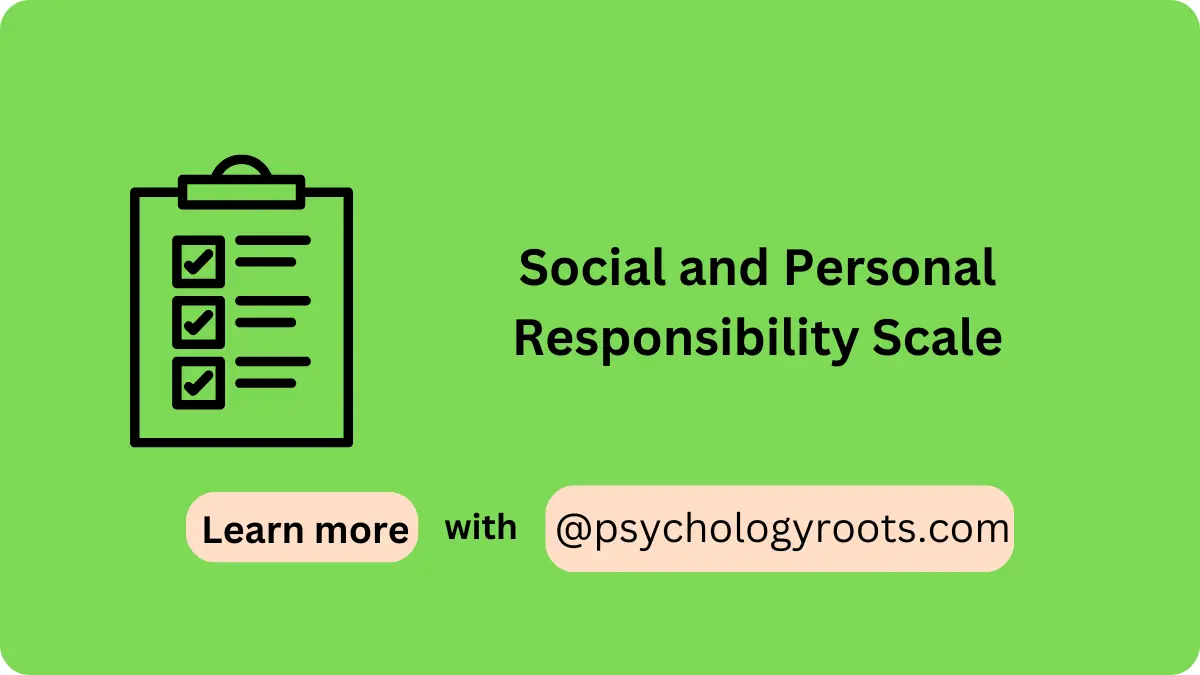Table of Contents
Social and Personal Responsibility Scale
Here in this post, we are sharing the “Social and Personal Responsibility Scale”. You can read psychometric and Author information. We have thousands of Scales and questionnaires in our collection (See Scales and Questionnaires). You can demand us any scale and questionnaires related to psychology through our community, and we will provide you with a short time. Keep visiting Psychology Roots.
About Social and Personal Responsibility Scale
Scale Name
Social and Personal Responsibility Scale
Author Details
Conrad and Hedin (1981)
Translation Availability
English

Background/Description
The Social and Personal Responsibility Scale is designed to assess the degree to which youth take on responsibilities both personally and socially. This includes behaviors such as helping others, addressing school or community challenges, and making and fulfilling commitments. The scale emphasizes evaluating an individual’s sense of duty in contributing to the well-being of others and maintaining their personal obligations.
This scale is targeted toward adolescents aged 12–18 years (Grades 6–12) and comprises 21 items. Respondents are required to reflect on their attitudes and behaviors, with scoring designed to capture variations in social and personal responsibility. Detailed instructions are essential to ensure respondents comprehend and accurately complete the scale.
Administration, Scoring and Interpretation
- Target Population: Adolescents aged 12–18 years (Grades 6–12).
- Format: Self-report questionnaire.
- Instructions:
- Explain the response format in detail before administering the scale:
- Always True for Me = 1
- Sometimes True for Me = 2
- Sometimes True for Me = 3
- Always True for Me = 4
- Ensure respondents understand that only one box should be chosen per item.
- Provide an example question to clarify how to answer.
- Instruct respondents to select the response that best reflects their behavior or belief.
- Scoring:
- Reverse code items: 4, 9, 11, 12, 14, 15, 19, and 20.
- Sum the responses to calculate a total score.
- Higher scores indicate greater social and personal responsibility.
Reliability and Validity
- Reliability: The scale demonstrates strong internal consistency, with an alpha coefficient of 0.83.
- Validity: Widely used to measure responsibility among youth, the scale provides a reliable assessment of social and personal responsibility in the context of school and community engagement.
Available Versions
21-Items
Reference
BROZMAnOVÁ GReGOROVÁ, A., Kubealaková, M., & Heinzová, Z. (2017). Service-learning and development of social and personal responsibility. Actas de la IV Jornada de investigadores sobre aprendizaje-servicio.
Important Link
Scale File:
Frequently Asked Questions
Q1: What does the Social and Personal Responsibility Scale measure?
It evaluates the extent to which adolescents take responsibility for personal and social matters, including helping others and solving community issues.
Q2: Who is the target audience for this scale?
Adolescents aged 12–18 years, typically in Grades 6–12.
Q3: How is the scale scored?
Items are rated on a 4-point scale. Responses are reverse coded for certain items, and a higher total score reflects greater responsibility.
Q4: Is permission required to use this scale?
No, permission is not required to use this scale.
Q5: Why is clear explanation important for this scale?
The response format and reverse coding can be complex, so detailed instructions ensure accurate and meaningful responses.
Disclaimer
Please note that Psychology Roots does not have the right to grant permission for the use of any psychological scales or assessments listed on its website. To use any scale or assessment, you must obtain permission directly from the author or translator of the tool. Psychology Roots provides information about various tools and their administration procedures, but it is your responsibility to obtain proper permissions before using any scale or assessment. If you need further information about an author’s contact details, please submit a query to the Psychology Roots team.
Help Us Improve This Article
Have you discovered an inaccuracy? We put out great effort to give accurate and scientifically trustworthy information to our readers. Please notify us if you discover any typographical or grammatical errors.
Make a comment. We acknowledge and appreciate your efforts.
Share With Us
If you have any scale or any material related to psychology kindly share it with us at psychologyroots@gmail.com. We help others on behalf of you.